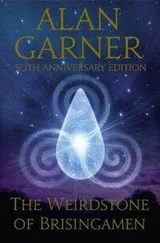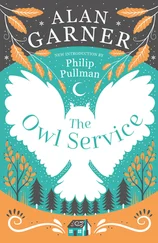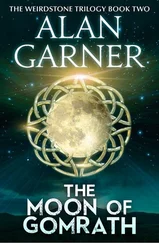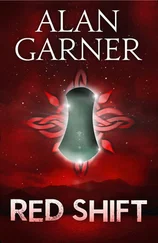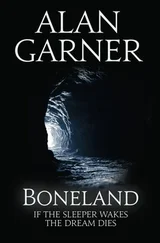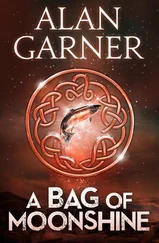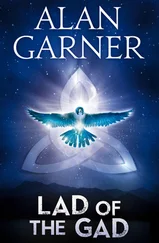July next, farmer goes to the blacksmith and has ever so many thin iron rods made, and he plants them all over brownie’s half of the field.
Anyway, they start mowing at daybreak. Farmer walks through his patch, up and down, sweet as a comb, but brownie’s snagged like I don’t know what.
“Mortal hard docks, these: mortal hard docks,” he keeps clacking.
Anyway, after an hour of this the rods have knocked the edge from his scythe and it’s as blunt as a plough handle, and brownie is right borsant.
Now in a match, mowers take time off together for sharpening up; so brownie calls to farmer, “When do we wiffle-waffle, mate?”
“Oh, about noon, maybe,” says farmer.
“Noon!” says brownie. “I’ve lost my land!”
He drops his scythe, and he’s never seen on that farm again. And no wonder.
Adapted from the Translation of WHITLEY STOKES
I have to admit to a weakness for Celtic legends. It would be all too easy to fill this book with them. For me, no other people were so rich and terrifying in their imagination. They found no need to explain: the stories often appear to be strung together at random – and yet there is always the feeling that everything is very simple. We are looking at a real and brilliant and logical world through strange glass.
You can take this story all at once, or bit by bit. All at once will crowd your brain with colour: bit by bit will make thoughts like yeast.
The Voyage of Maelduin’s Boat This. Three Years and Seven Months Was It Wandering in the Ocean.
 here was a famous man of the Eoganacht of Ninuss (that is, the Eoganacht of the Arans): his name was Ailill of the Edge of Battle. A mighty soldier was he, and a hero-lord of his own tribe and kindred. And there was a young nun, the prioress of a church of nuns, with whom he met. Between them both there was a noble boy; Maelduin, son of Ailill, was he.
here was a famous man of the Eoganacht of Ninuss (that is, the Eoganacht of the Arans): his name was Ailill of the Edge of Battle. A mighty soldier was he, and a hero-lord of his own tribe and kindred. And there was a young nun, the prioress of a church of nuns, with whom he met. Between them both there was a noble boy; Maelduin, son of Ailill, was he.
Now this boy was reared by the king’s queen, and she gave out that she was his mother.
Now the one fostermother reared him and the king’s three sons, in one cradle, and on one breast, and on one lap.
Beautiful indeed was his form, and it is doubtful if there has been in flesh anyone as beautiful as he. So he grew up till he was a young warrior and fit to use weapons. Great, then, was his brightness and his gaiety and his playfulness. In his play he outwent all his comrades, both in throwing balls, and running, and leaping, and putting stones, and racing horses. He had truly the victory in each of those games.
One day, then, a certain haughty warrior grew envious against him, and he said in raging anger, “You,” he said, “whose clan and kindred no one knows, whose mother and father no one knows, to vanquish us in every game, whether we contend with you on land or on water, or on the draughtboard!”
So then Maelduin was silent, for till that time he had thought that he was the son of the king and of the queen his fostermother. Then he said to his fostermother, “I will not eat and I will not drink until you tell me,” said he, “my mother and my father.”
“But,” said she, “why are you asking after that? Do not take to heart the words of the proud warriors. I am your mother,” said she. “The love of the people of the earth for their sons is no greater than the love I bear to you.”
“That may be,” said he: “nevertheless, make known my parents to me.”
So his fostermother went with him, and delivered him into his mother’s hand; and thereafter he entreated his mother to declare his father to him.
“Silly,” said she, “is what you are doing, for if you should know your father you would have no good of him, and you will not be the gladder, for he died long ago.”
“It is the better for me to know it,” said he, “however it be.”
Then his mother told him the truth. “Ailill of the Edge of Battle was your father,” said she, “of the Eoganacht of Ninuss.”
Then Maelduin went to his fatherland and to his heritage, having his three fosterbrothers with him; and beloved warriors were they. And then his kindred welcomed him, and gave great courage there.
At a certain time afterwards there was a number of warriors in the graveyard of Dubcluain, putting stones. So Maelduin’s foot was planted on the scorched ruin, and over it he was flinging the stone. A certain poison-tongued man – Briccne was his name – said to Maelduin: “It were better,” said he, “to avenge the man who was burnt there than to cast stones over his bare burnt bones.”
“Who was that?” said Maelduin.
“Ailill,” said he, “your own father.”
“Who killed him?” asked Maelduin.
Briccne replied: “Raiders of Leix,” said he, “and they destroyed him on this spot.”
Then Maelduin threw away the stone which he was about to cast, and took his mantle round him, and his armour on him; and he was mournful. And he asked the way to go to Leix, and the guides told him that he could go only by sea.
So he went into the country of Corcomroe to seek a charm and a blessing of a wizard who lived there, to begin building a boat. Nuca was the wizard’s name, and it is from him that Boirenn Nuca is called. He told Maelduin the day on which he should begin the boat, and the number of the crew that should go in her, which was seventeen men, or sixty according to others. And he told him that no number greater or less than that should go; and he told him the day he should set to sea.
Then Maelduin built a three-skinned boat; and they who were to go in it in his company were ready. German was there and Diuran the Rhymer.
So then he went to sea on the day that the wizard had told him to set out. When they had gone a little from land, after hoisting the sail, then came into the harbour after them his three fosterbrothers, the three sons of his fosterfather and fostermother; and they shouted to them to come back again to them to the end that they might go with them.
“Get you home,” said Maelduin; “for even though we should return to land, only the number we have here shall go with me.”
“We will go after you into the sea and be drowned there, unless you come to us.”
Then the three of them cast themselves into the sea, and they swam far from land. When Maelduin saw that, he turned towards them so that they might not be drowned, and he brought them into the boat.
1
They rowed that day till evening, and the night after it till midnight, when they found two small bald islands, with two forts in them; and then they heard out of the forts the noise and outcry of the drunkenness, and the soldiers, and the trophies. And this is what one man said to the other: “Stay off from me,” said he, “for I am a better hero than you, for it is I that slew Ailill of the Edge of Battle, and burnt Dubcluain on him; and no evil has so far been done to me by his kindred for it; and you have never done the like of that!”
‘We have the victory in our hands!” said German, and said Diuran the Rhymer. “Let us go and wreck these two forts.”
As they were saying these words, a great wind came upon them, so that they were driven over the sea all that night until morning. And even after morning they saw neither earth nor land, and they knew not where they were going. Then said Maelduin: “Leave the boat still, without rowing.”
Then they entered the great, endless ocean; and Maelduin afterwards said to his fosterbrothers: “You have caused this to us, hurling yourselves upon us in the boat in spite of the words of the enchanter and wizard, who told us that on board the boat we should go only the number that we were before you came.”
Читать дальше
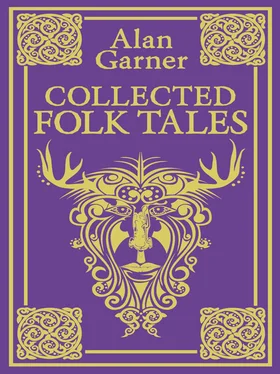

 here was a famous man of the Eoganacht of Ninuss (that is, the Eoganacht of the Arans): his name was Ailill of the Edge of Battle. A mighty soldier was he, and a hero-lord of his own tribe and kindred. And there was a young nun, the prioress of a church of nuns, with whom he met. Between them both there was a noble boy; Maelduin, son of Ailill, was he.
here was a famous man of the Eoganacht of Ninuss (that is, the Eoganacht of the Arans): his name was Ailill of the Edge of Battle. A mighty soldier was he, and a hero-lord of his own tribe and kindred. And there was a young nun, the prioress of a church of nuns, with whom he met. Between them both there was a noble boy; Maelduin, son of Ailill, was he.
